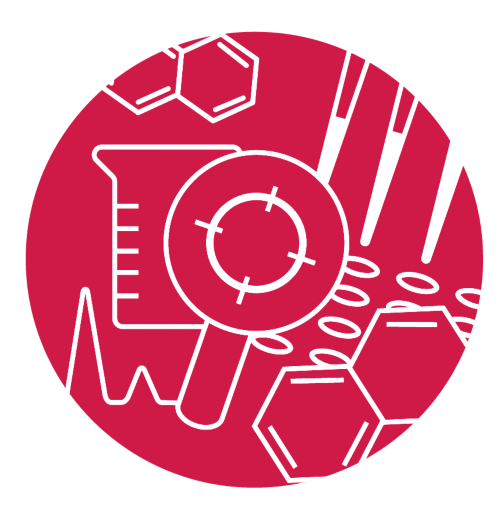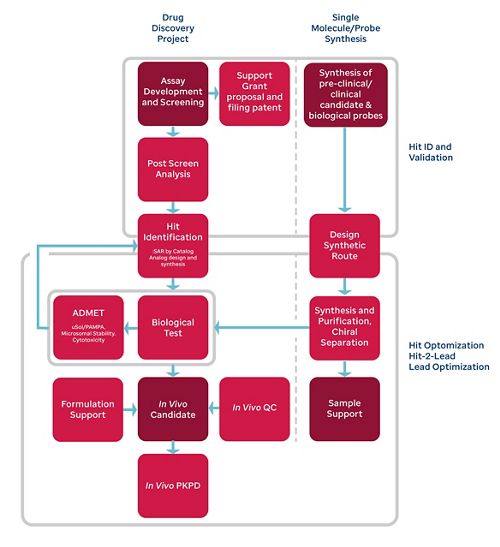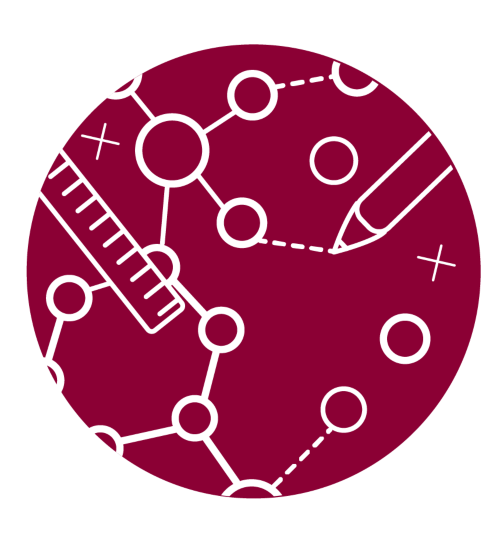St. Jude Family of Websites
Explore our cutting edge research, world-class patient care, career opportunities and more.
St. Jude Children's Research Hospital Home

- Fundraising
St. Jude Family of Websites
Explore our cutting edge research, world-class patient care, career opportunities and more.
St. Jude Children's Research Hospital Home

- Fundraising
Chemistry Centers
Acquire, develop, and deploy state-of-the-art chemistry capabilities to advance research at St. Jude towards the discovery of breakthrough treatments for catastrophic pediatric illnesses.
About the Centers
The CBT Chemistry Centers consist of three highly integrated centers that collectively provide state-of-the-art chemical probe design, synthesis, and evaluation of capabilities to support research at St. Jude.
The Chemistry Centers routinely assist collaborators by coordinating work with other CBT centers, providing training, consultation, and help with defining project strategy, writing grant applications, patents, and manuscripts for publication. Our projects are generally highly collaborative, involving an iterative exchange of material and data with research labs that often last months, if not years.
Chemical Biology Center

Chemical Biology Center (CBC) applies advanced chemical biology methods to develop sophisticated chemical tools designed to map and interrogate disease-related biological pathways. The CBC chemical toolbox includes PROTACs, molecular glues, pull-down, photoaffinity, and imaging probes. The center has experience developing and utilizing biochemical assays, including fluorescence polarization (FP), time-resolved fluorescence energy transfer (TR-FRET), AlphaScreen, and cell-based assays such as CellTiter-Glo, Caspase-Glo, alamar-blue and HiBit. The CBC is currently staffed with five scientists (four chemists and a structure biologist).


We reach out to researchers and ask, 'What do you think of this target? Do you think it's druggable? Can we find a small molecule? Can we find a chemical probe?' We're here to support and collaborate with the researchers within St. Jude and other PIs that have expertise in biology or pharmacology that don't have the expertise in chemistry or chemical probe discovery.
Gisele Nishiguchi, CBC Lead Scientist
Medicinal Chemistry Center

Medicinal Chemistry Center (MCC) : MCC focuses on identification and development of potent and selective small molecules for investigation of disease related biological targets in cells and in vivo preclinical models. Typically, the center engages in hypothesis driven research projects to provide novel chemical probes for targets where such molecules do not exist. The MCC’s role in these collaborations would drive projects from post-screening data analysis, hit generation and validation (e.g. HTS, fragment screening, rational design), through lead optimization relying on structure-based drug discovery, chemoinformatics and ADME data, to delivering robust in vitro/vivo chemical probes. The center is currently staffed with five chemists, four PhD and one MS scientists. .

Getting a hit is just the beginning of the process. Most compounds have to be optimized further to show any sort of activity, so you really have to commit yourself to the long game if you're going to look for new chemical matter. We constantly ask ourselves, 'Is this the best molecule we can make, or is there something we can do to improve it?'
Brandon Young, MCC Lead Scientist
Analytical Technologies Center

The Analytical Technologies Center (ATC) : ATC provides an extensive battery of assays designed to evaluate compound chemical, biochemical, biophysical and ADME properties. These include sample purity and integrity, aqueous solubility, permeability, microsomal and plasma stability, simulated gastric fluid stability, PBS stability, plasma/tissue protein binding, P-gp/BCRP efflux, as well as in vivo pharmacokinetic parameters such as drug plasma and brain unbound concentrations. The center also develops highly customized bioanalytical methods such as mass spectrometry-based biochemical assays, as well as drug formulations for in vivo studies. The center currently has 7 FTEs: two PhD scientists supporting the FTMS facility, and five PhD scientists in general analytical chemistry.

ATC generally provides high throughput analytical support to researchers and investigators in CBT and across the campus, depending on the lab's requirements. Working in ATC has indulged me with a broad experience in translational research. I became familiar with the entire drug discovery process from synthesis to screening, to preclinical studies.
Divyabharathi Chepyala, Senior Researcher
Publications
Center staff:
Chemical Biology Center (CBC)
- Gisele Nishiguchi - Sr Scientist-Managing Principal Chemist
- Anand Mayasundari - Lead Researcher
- Jamie A. Jarusiewicz - Sr Researcher
- Marisa Actis - Sr Researcher
- Anup Aggarwal, PhD - Scientist
Medicinal Chemistry Center (MCC)
- Brandon Young - Sr Scientist-Managing Principal Chemist
- Jeanine Price - Sr Researcher
- Jake Slavish- Scientist-Managing
- Kevin McGowan - Scientist
- Zhe Shi, PhD - Scientist
Analytical Technologies Center (ATC)
- Lei Yang - Sr Scientist-Managing Principal Chemist
- John Bowling - Scientist-Managing
- Xiang Fu - Lead Researcher
- Mary Ashley Rimmer - Sr Researcher
- Yong Li - Lead Researcher
- Divyabharathi Chepyala - Sr Researcher
Contact us
MS1000
St. Jude Children Research Hospital
Memphis, TN, 38105-3678 USA
Follow Us

Memphis, TN, 38105-3678 USA GET DIRECTIONS